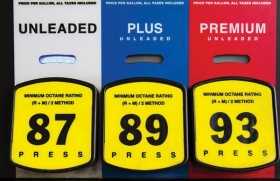Gasoline is cheap again, but at the same time, the extra charge to coddle an engine with premium instead of regular has never been higher.

At a Shell station in Tucson, Ariz., regular gasoline cost $1.17 a gallon earlier this month, according to GasBuddy.com, while premium was $1.75. That's nearly 50 percent more. In Chicago, a Pilot station had regular for $1.95 and premium for $3.09, 58 percent more. And an Exxon station in Newport News, Va., offered regular for $1.59 and premium for $2.89 -- 82 percent more.
Five years ago, premium cost an average of 7 percent more than regular, government data show.
At current prices, buying premium would cost an average driver several hundred dollars more this year, and potentially several thousand over the life of a vehicle. The sudden shift has effectively wiped out the fuel-economy advantage claimed by some models with turbocharged engines that demand premium, and it's undoubtedly making some drivers rethink whether the added cost is worth it.
The price difference might not matter much to those who can afford luxury and high-end performance cars, which typically require premium. But it can be painful for owners of cheaper cars that demand higher octane, including the Mini Cooper and Smart ForTwo, and confusing for drivers of vehicles that recommend premium who fear damaging the engine or voiding the warranty by using regular instead.
Nissan North America recommends drivers put premium in its Maxima and Juke. Company officials say it's fine to ignore that suggestion, and they acknowledge that more drivers are likely doing just that now that the savings are so substantial.
"We recommend premium fuel, but customers can feel free to use regular," said Tiago Castro, senior manager of product planning for Nissan North America. "At some point, they may not see the value in premium. We make it clear it's recommended, not required."
Fuel octane requirements are likely not among the specs that most people study when shopping for a new vehicle, yet they'll be faced with the decision of which grade to buy every time they stop to fill up.
"If it says "premium recommended,' then you don't have to -- why spend the extra money?" said Carroll Lachnit, a consumer advice editor at Edmunds.com. "But you're not going to save that much money, so if you've spent the money on a sports car or a luxury car, don't cheap out now."
